Environmental Pollution and Health in Saudi Arabia: An Analysis
VerifiedAdded on 2022/09/24
|5
|1390
|41
Essay
AI Summary
This essay provides a comprehensive overview of environmental pollution issues in the Kingdom of Saudi Arabia (KSA), focusing on the impact on public health. It begins by highlighting the country's reliance on crude oil production and the resulting environmental challenges, including desertification, air, water, and soil pollution. The essay delves into the primary sources of pollution, such as crude oil processing and desalination plants, and the pathways through which populations are exposed. It then explores various methods for controlling and preventing pollution, including the use of solar power and smart water recycling systems. Furthermore, the essay examines the role of public health policies and environmental laws in supporting and promoting public health by financing research, promoting awareness, and setting regulations. The conclusion emphasizes the critical need for governmental action to address pollution and protect the health of the population.
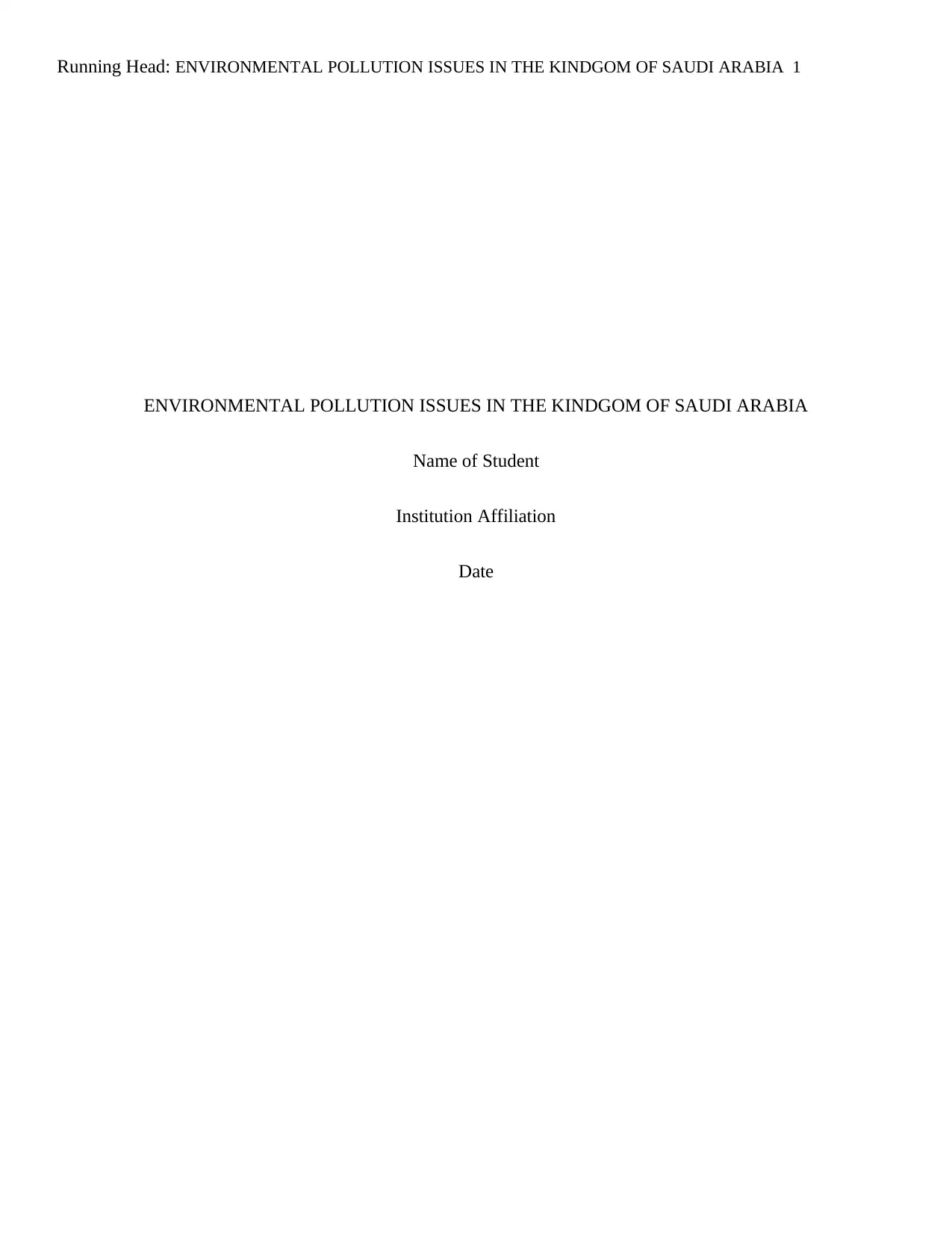
Running Head: ENVIRONMENTAL POLLUTION ISSUES IN THE KINDGOM OF SAUDI ARABIA 1
ENVIRONMENTAL POLLUTION ISSUES IN THE KINDGOM OF SAUDI ARABIA
Name of Student
Institution Affiliation
Date
ENVIRONMENTAL POLLUTION ISSUES IN THE KINDGOM OF SAUDI ARABIA
Name of Student
Institution Affiliation
Date
Paraphrase This Document
Need a fresh take? Get an instant paraphrase of this document with our AI Paraphraser
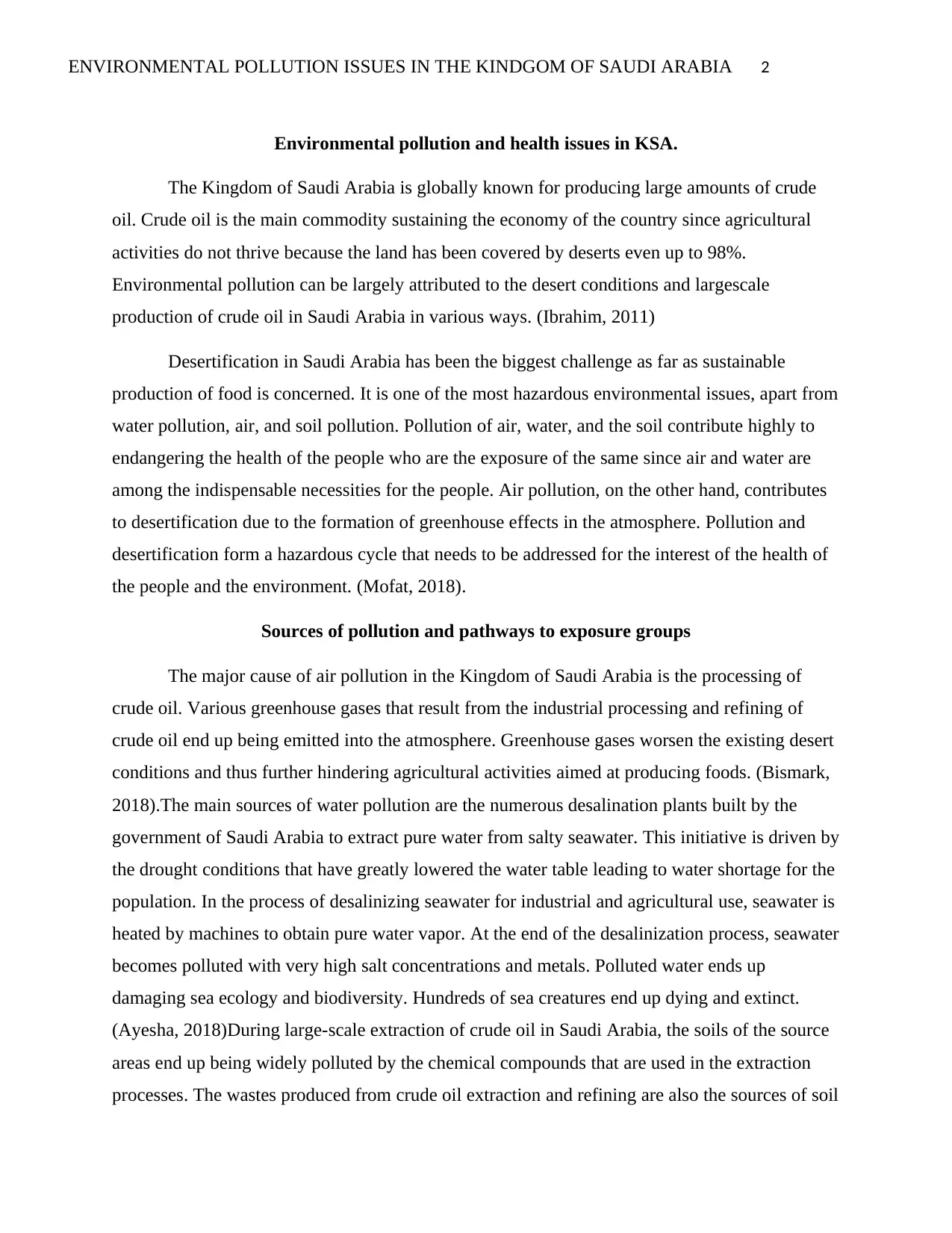
ENVIRONMENTAL POLLUTION ISSUES IN THE KINDGOM OF SAUDI ARABIA 2
Environmental pollution and health issues in KSA.
The Kingdom of Saudi Arabia is globally known for producing large amounts of crude
oil. Crude oil is the main commodity sustaining the economy of the country since agricultural
activities do not thrive because the land has been covered by deserts even up to 98%.
Environmental pollution can be largely attributed to the desert conditions and largescale
production of crude oil in Saudi Arabia in various ways. (Ibrahim, 2011)
Desertification in Saudi Arabia has been the biggest challenge as far as sustainable
production of food is concerned. It is one of the most hazardous environmental issues, apart from
water pollution, air, and soil pollution. Pollution of air, water, and the soil contribute highly to
endangering the health of the people who are the exposure of the same since air and water are
among the indispensable necessities for the people. Air pollution, on the other hand, contributes
to desertification due to the formation of greenhouse effects in the atmosphere. Pollution and
desertification form a hazardous cycle that needs to be addressed for the interest of the health of
the people and the environment. (Mofat, 2018).
Sources of pollution and pathways to exposure groups
The major cause of air pollution in the Kingdom of Saudi Arabia is the processing of
crude oil. Various greenhouse gases that result from the industrial processing and refining of
crude oil end up being emitted into the atmosphere. Greenhouse gases worsen the existing desert
conditions and thus further hindering agricultural activities aimed at producing foods. (Bismark,
2018).The main sources of water pollution are the numerous desalination plants built by the
government of Saudi Arabia to extract pure water from salty seawater. This initiative is driven by
the drought conditions that have greatly lowered the water table leading to water shortage for the
population. In the process of desalinizing seawater for industrial and agricultural use, seawater is
heated by machines to obtain pure water vapor. At the end of the desalinization process, seawater
becomes polluted with very high salt concentrations and metals. Polluted water ends up
damaging sea ecology and biodiversity. Hundreds of sea creatures end up dying and extinct.
(Ayesha, 2018)During large-scale extraction of crude oil in Saudi Arabia, the soils of the source
areas end up being widely polluted by the chemical compounds that are used in the extraction
processes. The wastes produced from crude oil extraction and refining are also the sources of soil
Environmental pollution and health issues in KSA.
The Kingdom of Saudi Arabia is globally known for producing large amounts of crude
oil. Crude oil is the main commodity sustaining the economy of the country since agricultural
activities do not thrive because the land has been covered by deserts even up to 98%.
Environmental pollution can be largely attributed to the desert conditions and largescale
production of crude oil in Saudi Arabia in various ways. (Ibrahim, 2011)
Desertification in Saudi Arabia has been the biggest challenge as far as sustainable
production of food is concerned. It is one of the most hazardous environmental issues, apart from
water pollution, air, and soil pollution. Pollution of air, water, and the soil contribute highly to
endangering the health of the people who are the exposure of the same since air and water are
among the indispensable necessities for the people. Air pollution, on the other hand, contributes
to desertification due to the formation of greenhouse effects in the atmosphere. Pollution and
desertification form a hazardous cycle that needs to be addressed for the interest of the health of
the people and the environment. (Mofat, 2018).
Sources of pollution and pathways to exposure groups
The major cause of air pollution in the Kingdom of Saudi Arabia is the processing of
crude oil. Various greenhouse gases that result from the industrial processing and refining of
crude oil end up being emitted into the atmosphere. Greenhouse gases worsen the existing desert
conditions and thus further hindering agricultural activities aimed at producing foods. (Bismark,
2018).The main sources of water pollution are the numerous desalination plants built by the
government of Saudi Arabia to extract pure water from salty seawater. This initiative is driven by
the drought conditions that have greatly lowered the water table leading to water shortage for the
population. In the process of desalinizing seawater for industrial and agricultural use, seawater is
heated by machines to obtain pure water vapor. At the end of the desalinization process, seawater
becomes polluted with very high salt concentrations and metals. Polluted water ends up
damaging sea ecology and biodiversity. Hundreds of sea creatures end up dying and extinct.
(Ayesha, 2018)During large-scale extraction of crude oil in Saudi Arabia, the soils of the source
areas end up being widely polluted by the chemical compounds that are used in the extraction
processes. The wastes produced from crude oil extraction and refining are also the sources of soil
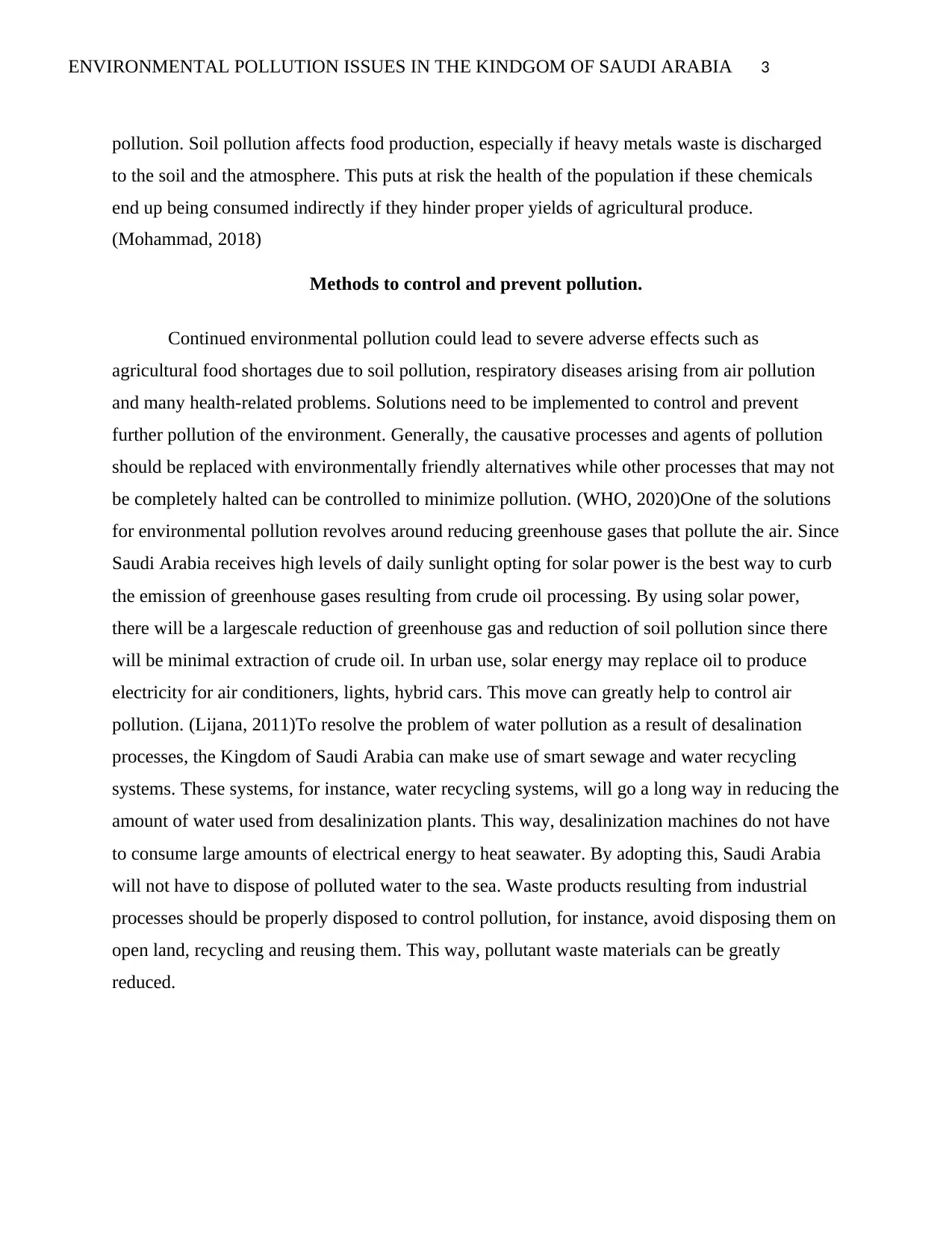
ENVIRONMENTAL POLLUTION ISSUES IN THE KINDGOM OF SAUDI ARABIA 3
pollution. Soil pollution affects food production, especially if heavy metals waste is discharged
to the soil and the atmosphere. This puts at risk the health of the population if these chemicals
end up being consumed indirectly if they hinder proper yields of agricultural produce.
(Mohammad, 2018)
Methods to control and prevent pollution.
Continued environmental pollution could lead to severe adverse effects such as
agricultural food shortages due to soil pollution, respiratory diseases arising from air pollution
and many health-related problems. Solutions need to be implemented to control and prevent
further pollution of the environment. Generally, the causative processes and agents of pollution
should be replaced with environmentally friendly alternatives while other processes that may not
be completely halted can be controlled to minimize pollution. (WHO, 2020)One of the solutions
for environmental pollution revolves around reducing greenhouse gases that pollute the air. Since
Saudi Arabia receives high levels of daily sunlight opting for solar power is the best way to curb
the emission of greenhouse gases resulting from crude oil processing. By using solar power,
there will be a largescale reduction of greenhouse gas and reduction of soil pollution since there
will be minimal extraction of crude oil. In urban use, solar energy may replace oil to produce
electricity for air conditioners, lights, hybrid cars. This move can greatly help to control air
pollution. (Lijana, 2011)To resolve the problem of water pollution as a result of desalination
processes, the Kingdom of Saudi Arabia can make use of smart sewage and water recycling
systems. These systems, for instance, water recycling systems, will go a long way in reducing the
amount of water used from desalinization plants. This way, desalinization machines do not have
to consume large amounts of electrical energy to heat seawater. By adopting this, Saudi Arabia
will not have to dispose of polluted water to the sea. Waste products resulting from industrial
processes should be properly disposed to control pollution, for instance, avoid disposing them on
open land, recycling and reusing them. This way, pollutant waste materials can be greatly
reduced.
pollution. Soil pollution affects food production, especially if heavy metals waste is discharged
to the soil and the atmosphere. This puts at risk the health of the population if these chemicals
end up being consumed indirectly if they hinder proper yields of agricultural produce.
(Mohammad, 2018)
Methods to control and prevent pollution.
Continued environmental pollution could lead to severe adverse effects such as
agricultural food shortages due to soil pollution, respiratory diseases arising from air pollution
and many health-related problems. Solutions need to be implemented to control and prevent
further pollution of the environment. Generally, the causative processes and agents of pollution
should be replaced with environmentally friendly alternatives while other processes that may not
be completely halted can be controlled to minimize pollution. (WHO, 2020)One of the solutions
for environmental pollution revolves around reducing greenhouse gases that pollute the air. Since
Saudi Arabia receives high levels of daily sunlight opting for solar power is the best way to curb
the emission of greenhouse gases resulting from crude oil processing. By using solar power,
there will be a largescale reduction of greenhouse gas and reduction of soil pollution since there
will be minimal extraction of crude oil. In urban use, solar energy may replace oil to produce
electricity for air conditioners, lights, hybrid cars. This move can greatly help to control air
pollution. (Lijana, 2011)To resolve the problem of water pollution as a result of desalination
processes, the Kingdom of Saudi Arabia can make use of smart sewage and water recycling
systems. These systems, for instance, water recycling systems, will go a long way in reducing the
amount of water used from desalinization plants. This way, desalinization machines do not have
to consume large amounts of electrical energy to heat seawater. By adopting this, Saudi Arabia
will not have to dispose of polluted water to the sea. Waste products resulting from industrial
processes should be properly disposed to control pollution, for instance, avoid disposing them on
open land, recycling and reusing them. This way, pollutant waste materials can be greatly
reduced.
⊘ This is a preview!⊘
Do you want full access?
Subscribe today to unlock all pages.

Trusted by 1+ million students worldwide
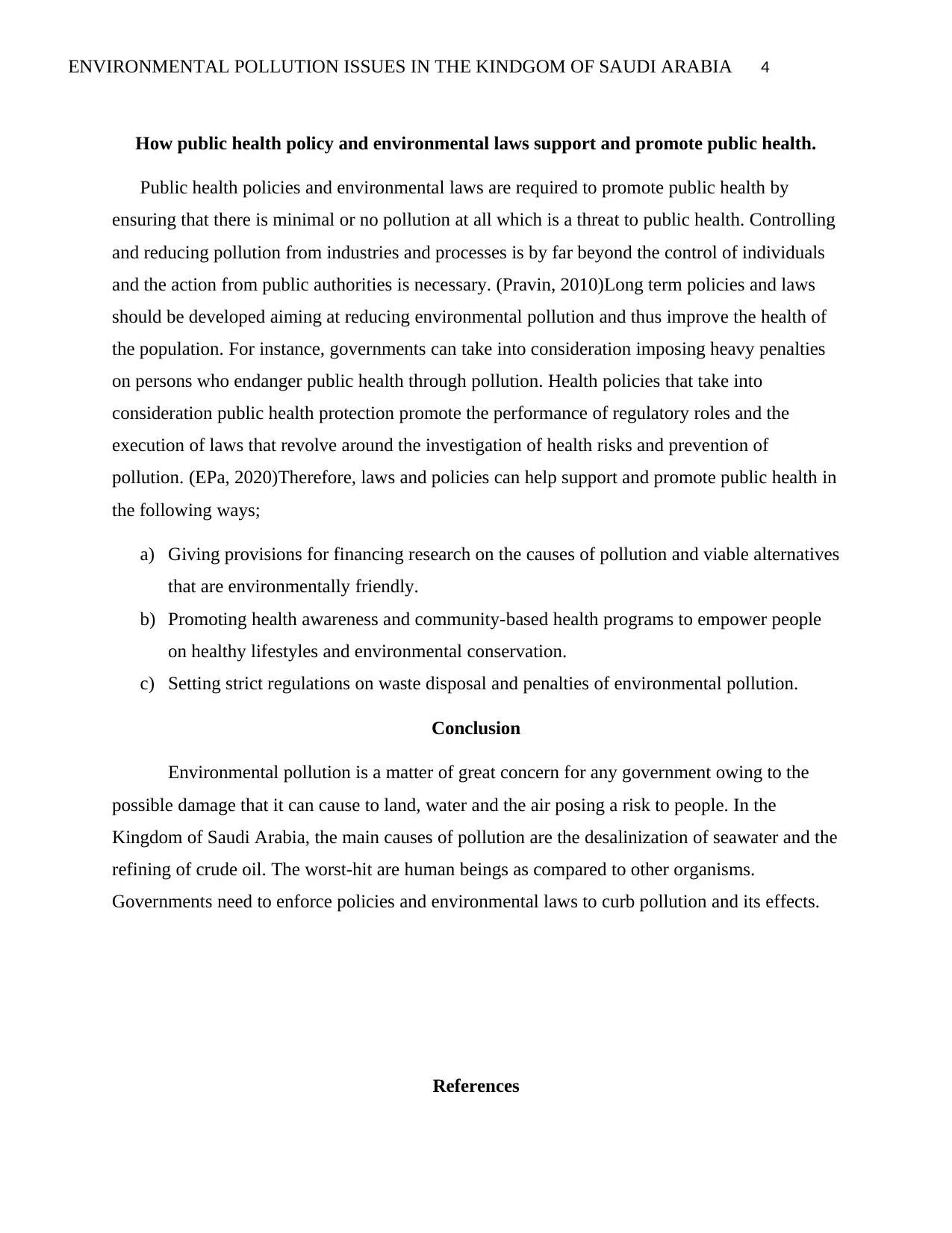
ENVIRONMENTAL POLLUTION ISSUES IN THE KINDGOM OF SAUDI ARABIA 4
How public health policy and environmental laws support and promote public health.
Public health policies and environmental laws are required to promote public health by
ensuring that there is minimal or no pollution at all which is a threat to public health. Controlling
and reducing pollution from industries and processes is by far beyond the control of individuals
and the action from public authorities is necessary. (Pravin, 2010)Long term policies and laws
should be developed aiming at reducing environmental pollution and thus improve the health of
the population. For instance, governments can take into consideration imposing heavy penalties
on persons who endanger public health through pollution. Health policies that take into
consideration public health protection promote the performance of regulatory roles and the
execution of laws that revolve around the investigation of health risks and prevention of
pollution. (EPa, 2020)Therefore, laws and policies can help support and promote public health in
the following ways;
a) Giving provisions for financing research on the causes of pollution and viable alternatives
that are environmentally friendly.
b) Promoting health awareness and community-based health programs to empower people
on healthy lifestyles and environmental conservation.
c) Setting strict regulations on waste disposal and penalties of environmental pollution.
Conclusion
Environmental pollution is a matter of great concern for any government owing to the
possible damage that it can cause to land, water and the air posing a risk to people. In the
Kingdom of Saudi Arabia, the main causes of pollution are the desalinization of seawater and the
refining of crude oil. The worst-hit are human beings as compared to other organisms.
Governments need to enforce policies and environmental laws to curb pollution and its effects.
References
How public health policy and environmental laws support and promote public health.
Public health policies and environmental laws are required to promote public health by
ensuring that there is minimal or no pollution at all which is a threat to public health. Controlling
and reducing pollution from industries and processes is by far beyond the control of individuals
and the action from public authorities is necessary. (Pravin, 2010)Long term policies and laws
should be developed aiming at reducing environmental pollution and thus improve the health of
the population. For instance, governments can take into consideration imposing heavy penalties
on persons who endanger public health through pollution. Health policies that take into
consideration public health protection promote the performance of regulatory roles and the
execution of laws that revolve around the investigation of health risks and prevention of
pollution. (EPa, 2020)Therefore, laws and policies can help support and promote public health in
the following ways;
a) Giving provisions for financing research on the causes of pollution and viable alternatives
that are environmentally friendly.
b) Promoting health awareness and community-based health programs to empower people
on healthy lifestyles and environmental conservation.
c) Setting strict regulations on waste disposal and penalties of environmental pollution.
Conclusion
Environmental pollution is a matter of great concern for any government owing to the
possible damage that it can cause to land, water and the air posing a risk to people. In the
Kingdom of Saudi Arabia, the main causes of pollution are the desalinization of seawater and the
refining of crude oil. The worst-hit are human beings as compared to other organisms.
Governments need to enforce policies and environmental laws to curb pollution and its effects.
References
Paraphrase This Document
Need a fresh take? Get an instant paraphrase of this document with our AI Paraphraser
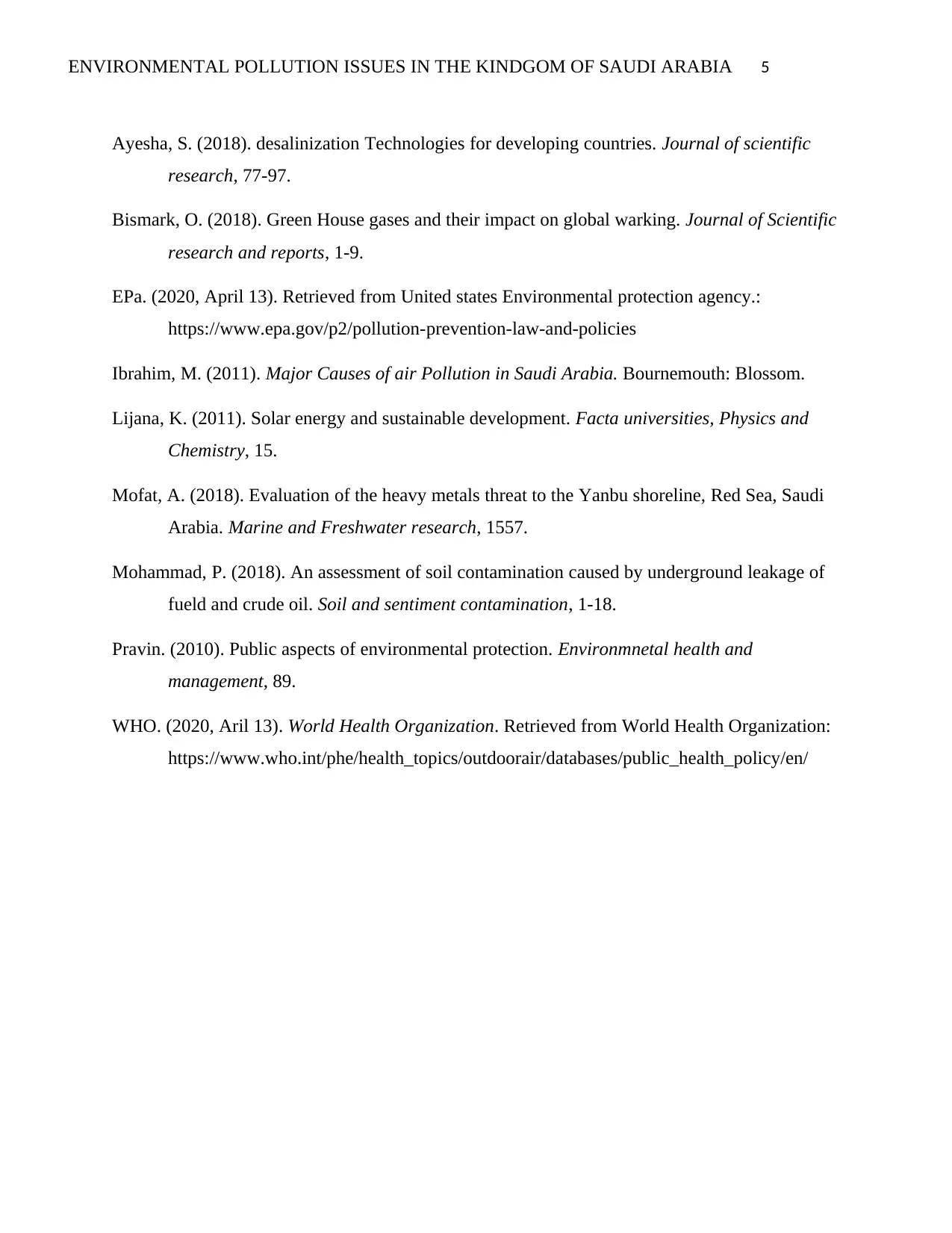
ENVIRONMENTAL POLLUTION ISSUES IN THE KINDGOM OF SAUDI ARABIA 5
Ayesha, S. (2018). desalinization Technologies for developing countries. Journal of scientific
research, 77-97.
Bismark, O. (2018). Green House gases and their impact on global warking. Journal of Scientific
research and reports, 1-9.
EPa. (2020, April 13). Retrieved from United states Environmental protection agency.:
https://www.epa.gov/p2/pollution-prevention-law-and-policies
Ibrahim, M. (2011). Major Causes of air Pollution in Saudi Arabia. Bournemouth: Blossom.
Lijana, K. (2011). Solar energy and sustainable development. Facta universities, Physics and
Chemistry, 15.
Mofat, A. (2018). Evaluation of the heavy metals threat to the Yanbu shoreline, Red Sea, Saudi
Arabia. Marine and Freshwater research, 1557.
Mohammad, P. (2018). An assessment of soil contamination caused by underground leakage of
fueld and crude oil. Soil and sentiment contamination, 1-18.
Pravin. (2010). Public aspects of environmental protection. Environmnetal health and
management, 89.
WHO. (2020, Aril 13). World Health Organization. Retrieved from World Health Organization:
https://www.who.int/phe/health_topics/outdoorair/databases/public_health_policy/en/
Ayesha, S. (2018). desalinization Technologies for developing countries. Journal of scientific
research, 77-97.
Bismark, O. (2018). Green House gases and their impact on global warking. Journal of Scientific
research and reports, 1-9.
EPa. (2020, April 13). Retrieved from United states Environmental protection agency.:
https://www.epa.gov/p2/pollution-prevention-law-and-policies
Ibrahim, M. (2011). Major Causes of air Pollution in Saudi Arabia. Bournemouth: Blossom.
Lijana, K. (2011). Solar energy and sustainable development. Facta universities, Physics and
Chemistry, 15.
Mofat, A. (2018). Evaluation of the heavy metals threat to the Yanbu shoreline, Red Sea, Saudi
Arabia. Marine and Freshwater research, 1557.
Mohammad, P. (2018). An assessment of soil contamination caused by underground leakage of
fueld and crude oil. Soil and sentiment contamination, 1-18.
Pravin. (2010). Public aspects of environmental protection. Environmnetal health and
management, 89.
WHO. (2020, Aril 13). World Health Organization. Retrieved from World Health Organization:
https://www.who.int/phe/health_topics/outdoorair/databases/public_health_policy/en/
1 out of 5
Related Documents
Your All-in-One AI-Powered Toolkit for Academic Success.
+13062052269
info@desklib.com
Available 24*7 on WhatsApp / Email
![[object Object]](/_next/static/media/star-bottom.7253800d.svg)
Unlock your academic potential
Copyright © 2020–2026 A2Z Services. All Rights Reserved. Developed and managed by ZUCOL.




